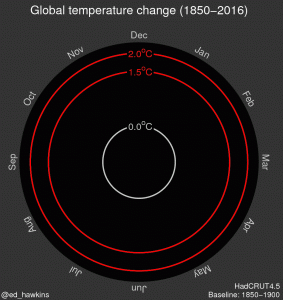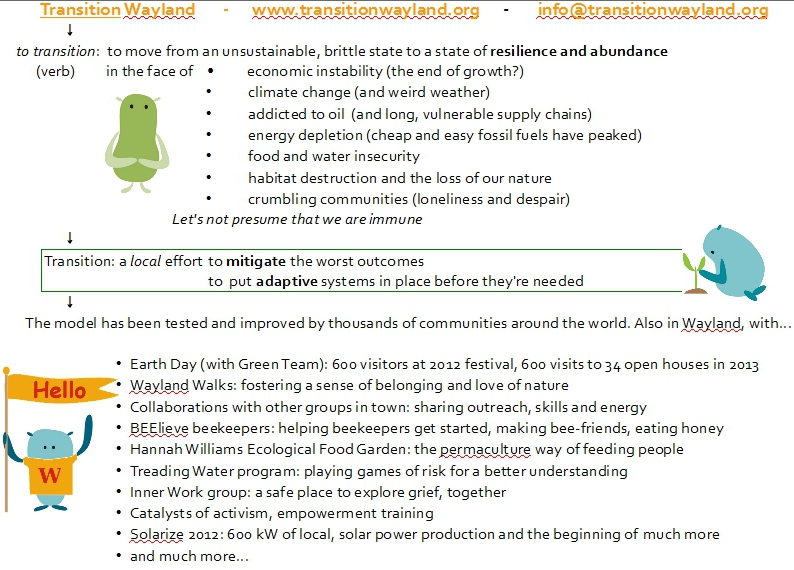Our mission statement
Our vision for our town is of a community that thrives in the face of the challenges of our time. We aim to realize this by building our resilience,
- by fostering our sense of local community, well-being and belonging
- by raising awareness of the challenges of our time, especially of climate change, fossil fuel dependence and economic and social injustice
- by empowering all residents with the tools and confidence for effective, local action
- by acting in the spirit of collaboration, engendering a shared, hopeful vision
- by preparing by putting systems (local economy, food, energy, etc.) in place for when they’re needed.
In 2017, Transition Wayland and the Wayland Energy and Climate Committee began collaborating more closely. As of June 2017, with the Selectmen’s approval, both groups became an MCAN – Massachusetts Climate Action Network – chapter.
!~!

click on this image and, in the new screen, move your cursor over it for the animation. (source: http://www.climate-lab-book.ac.uk/spirals/)
What is Transitioning?
What is the Transition Model?
What does a Transition Town do?
A Stab at It, by Kaat Vander Straeten
(To) Transition is a verb indicating the movement of a community from an unsustainable and brittle state to a state of sustainability and resilience.
Communities must do this in the face of the many interrelated problems and predicaments that we face:
- economic instability (the end of growth?)
- climate change (and weird weather)
- oil dependence (a shaky supply chain)
- energy depletion (have fossil fuels peaked?)
- food insecurity (where does our food come from, how is it grown?)
- habitat destruction and the loss of our nature (the greatest extinction since the age of the dinosaurs)
- the loss of community (loneliness, despair)
A problem is temporary, it can be solved,
it just takes work
A predicament is permanent, it cannot (can no longer) be solved,
it takes work and adaptation
Even just one of these problems can put our brittle communities under tremendous stress.
For the oil that heats our houses in winter and the electricity that cools them in summer, for our cars, for our food and for all of the luxuries we have come to think of as ours by right… for all of these we are dependent on long, convoluted supply chains of which we know very little and over which we have very little to no control. The slightest disturbance to these chains can severely rattle us.
In the meantime our clean air and water and a stable climate to grow food in are under threat.
Stressed out on a treadmill that just keeps speeding up, we have less and less time to acquire the skills that could help us mitigate these problems, and to tap into the rich resource that is our local community.
To transition is to study these issues, to determine how we can best prepare for them, and to roll up our sleeves and get to work, together. In many cases that means relocalizing our community’s economy, food, energy, and culture. We can design our communities so that we can rely upon one another, upon our many neighbors with their many talents.
Then we become resilient: no longer so dependent on sources beyond our control, and not independent either, but interdependent upon many resources within walking distance.
Resilience = strength
each function is performed by many elements
and each element performs many functions
Other communities in the US and worldwide are transitioning. They are working with a model called Transition Towns. The Transition Town model was originally formulated by UK permaculture designer Rob Hopkins and put to the test and much improved by thousands of communities around the world.
The Transition Model is
- comprehensive, as it tackles all interrelated problems and consolidates various isolated responses into one community groundswell.
- local and grassroots.
- proactive and empowering.
- inclusive, without political or religious or whatever affiliations. All ages are welcome and needed.
- hopeful, positive, solutions-focused, and faces despair, cynicism and guilt, then moves beyond it.
- unique, as each community makes the model its own.
I like to insist that Transition is not a movement. It is not a bandwagon that you either jump on or not, that you either belong to or not. It is a model, an incredibly rich and versatile tool box from which we choose the elements that are appropriate in our community at certain times. So I always add that Transition is:
- all-inclusive: whoever shows up is the right person.
- non-prescriptive, non-directive: give people good information and trust them to make the right decisions.
Let it go where it wants to go, which is where the community takes it
Tina Clarke, certified Transition Trainer, once put it this way:
Transition happens when someone says,
I have a gift to give to the community.
And the reply is: Be welcome! And thank you.
And here is what we can give to you.
As such Transition is not “a group,” but simply community. Those who start it and guide it (somewhat) aren’t “leaders,” but facilitators. Those who transition are not “followers” or “members”, but just people making life better.
What happens at Transition Events?
You name it! Fairs, movie showings, expert speakers, potlucks, book and tool libraries, skill shares, seed and plants swaps,
food coops, barn raisings, collective gardening, local currency, time banking…
How does it start?
In this case, it started with one person stepping up and calling for other interested people who want to be initiators. Six were found,and we formed a so-called “core” or “initiating group”. We started talking with people in town who are already doing this good work and seeking ways to support and celebrate them, to pull them into a town network. We began awareness raising about Transition, about climate change and our other predicaments. In the future we we will organize work groups (food, transport, waste, energy, economy, youth, etc.), connect with local government, create a comprehensive plan for the town to more forward to a resilient and sustainable future.
What can you do?
If you are interested in any or all of these issues, and would like to learn more, or do something about them, come to our talks or screenings, or contact us.
The network
We’re not alone. There are several Transition Towns in Massachusetts and one hundred of them in the US alone. They link together in the Transition US Network and, beyond that, the International Transition Network. These networks offer invaluable experience and support.

Hi,
My name is Claudia Gustafson. I have created a blog called The Happy Bee for the Metrowest area about green and sustainable living. I have included your organization in the Resource Menu under Be a Green Volunteer. I would appreciate if you would share my blog or facebook page. Thanks! https://thehappybeeblog.wordpress.com
I would like to see a plastic bag ban on the Wayland Town Meeting warrant in 2017, and would like to discuss this idea with you, seeking your advocacy and support with the “homework” required in advance. Many towns have done this; there is ample precedent and resources to draw upon. Boston is now considering this. Wayland should too.
Pingback: 16/11 Working Document | Transition Wayland
Hi,
I am new to the area and am interested in getting involved with Transitions Wayland. How do I do this? Who do I contact? Is their an email list I can sign up for to be notified of upcoming events? If so how do I find it? Do you ever have meetings later in the day or on weekends when people who are working would be able to attend?
Thank you!
If you have a local business and want to rank it on google maps in a specific area then this service is for you.
Google Map Stacking is one of the best ways to rank your GMB in a specific mile radius.
More info:
https://www.speed-seo.net/product/google-maps-pointers/
Thanks and Regards
Mike Laird
PS: Want an all in one Local Plan that includes everything?
https://www.speed-seo.net/product/local-seo-package/
Good Day
I have just took a look on your SEO for blog.transitionwayland.org for the ranking keywords and saw that your website could use an upgrade.
We will enhance your SEO metrics and ranks organically and safely, using only whitehat methods, while providing monthly reports and outstanding support.
Please check our services below, we offer SEO at cheap rates.
https://www.hilkom-digital.de/cheap-seo-packages/
Regards
Mike Baldwin
PS: Quality SEO content is included
Hi there
Just checked your blog.transitionwayland.org in MOZ and saw that you could use an authority boost.
With our service you will get a guaranteed Domain Authority score within just 3 months time. This will increase the organic visibility and strengthen your website authority, thus getting it stronger against G updates as well.
For more information, please check our offers
https://www.monkeydigital.co/domain-authority-plan/
NEW: Semrush DA is now possible
https://www.monkeydigital.co/semrush-da/
Thanks and regards
Mike Forster
Hey there! blog.transitionwayland.org
Did you know that it is possible to send appeals perfectly legal? We offering a way of sending requests through feedback forms to enhance cuѕtomer exрerience. You can find these forms on numerous websites.
When such appeals are sent, no personal information is utilized, and messages are delivered to forms specifically created to securely receive messages and appeals. Messages sent through Communication Forms have less of a chance of being classified as spam, as they are viewed as important.
Trу out our service without paying a dіme!
We can dispatch up to 50,000 messages for you.
The cost of sending one million messages is $59.
This offer is automatically generated.
Please use the contact details below to get in touch with us.
Contact us.
Telegram – https://t.me/FeedbackFormEU
Skype live:feedbackform2019
WhatsApp +375259112693
WhatsApp https://wa.me/+375259112693
We only use chat for communication.
Hi there
I Just checked your blog.transitionwayland.org ranks and saw that your site is trending down for some time.
If you are looking for a trend reversal, we have the right solution for you
We are offering affordable Content Marketing plans with humanly written SEO content
For more information, please check our offers
https://www.digital-x-press.com/product/content-marketing/
Thanks and regards
Mike Donovan